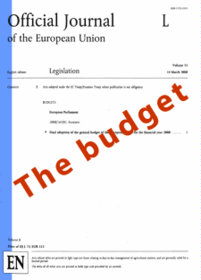

Budget
A budget normally provides for the spending of public money and for taxing citizens and companies to provide the necessary resources. In the EU all income comes from the member states but are called “own resources” because member states are obliged to pay them according to common rules for financing the EU.
The EU budget is drafted by the European Commission and is then decided by the Council of Ministers and the European Parliament through a budget procedure where Parliament has the last word on expenditures – except for agricultural spending.
The income side of the budget is decided solely by the Council through customs duties, agricultural levels, fines, 1% of the VAT base, plus a GNP-related contribution.
- “Commitments” are the amounts which can be spent (authorised) in any one year
- “Payments” are the amounts which may actually be paid in that year.
- The budget always has these two different columns, with commitments normally being higher than payments.
There is a ceiling on total EU income (own resources) which must be below 1.27 % of the total EU GNP. The budget can only go over that by unanimous agreement among member states.
The European Court of Auditors audits the accounts. Each year since 1994 the Court has declined to give a general endorsement approving the validity of the underlying transactions.
The Council of Ministers always approves the accounts, seemingly with little or no question, while there is at least some critical discussion of them in the European Parliament before their final approval.
Notes
The budget for 2013 was €132.8 billion for both expenditures and income.
Before 2009 the ministers in the Council had the last word on so-called compulsory expenditures or obligatory spending, which was mainly spent at the time on the agricultural budget.
The European Parliament had the last word on non-obligatory or non-compulsory expenditures, covering most other purposes.
There have been several battles over the classification of expenditures, with the result that the European Parliament has acquired more powers over the years. Non-obligatory spending has been increased from 8% of the budget in the seventies to 58% in 2003. The classification was decided by an inter-institutional agreement until the distinction was scrapped by the Lisbon Treaty.
Links
http://ec.europa.eu/budget/index_en.cfm
http://europa.eu/pol/financ/index_en.htm